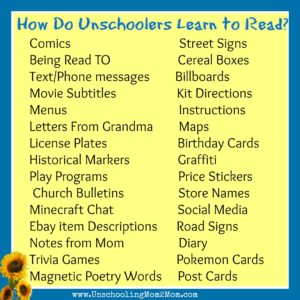Unschooled kids learn to read in the same age range as kids in school, generally between 6 and 9, some earlier and some later. All kids would do this except that all kids are subjected to reading instruction. It’s assumed the instruction is responsible for kids learning to read. But it isn’t. All that energy is no more than a song and dance while the kids grow ready to read.
Joyce Fetteroll
Unschooling websites with pages of stories, articles, & podcasts about how children learn to read without formal lessons:
Reading posts on the Texas Unschoolers blog
Reading articles curated by Life Learning Magazine
Learning to Read on Unschooling Mom2Mom
Podcasts about Reading on Exploring Unschooling Podcast/Living Joyfully (transcripts are available if you prefer to read)
Learning to Read Q&A on Joyfully Rejoycing
WHAT ABOUT LEARNING DIFFERENCES?
Collection of resources for Dyslexic Unschoolers.
You may also find our Neurodivergent Unschooling page helpful.
Quotes about Reading
I credit not being forced to read things other people decided were best for me with allowing me the space to find what I, personally, loved about books and reading. I wasn’t turned off of reading, or turned off of a certain genre or type of book, by being forced across a threshold that was not meant for me. Letting people come to things in their own time, when and if they want to, allows them to figure out what’s right for them, which parts of the literary world they wish to explore and which parts they want to steer clear of.
Idzie Desmarais
Evidence suggests that starting math or reading earlier doesn’t yield lasting advantages. And teaching concepts before developmentally appropriate for an individual may lead to lifelong loathing/avoidance of a subject, like those that say ‘I’m not a reader’ or ‘I’m bad at math.’ They may not have been allowed to approach reading and math on their own terms in a way that worked for them.
From the Rivertowns Patch article, Why Parents Are Choosing To ‘Unschool’ Their Children by Ilana Donna Arazie
Parents worry kids won’t read anything else or develop the skills to read longer books. In fact the opposite is true. Kids who read graphic novels are more likely to develop a love of reading.
Sarah Lindenfeld Hall
We’re constantly reading for skill. We’re constantly asking kids to do something with their reading, and then wondering why they’re choosing to leave us and never picking up another book. They can’t wait to get out of school so that they don’t have to read.
Pernille Ripp
Teacher & Author of Passionate Readers


